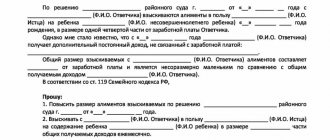Structure of the Decree
The draft includes 16 points, each of which contains clarifications that help ensure stable law enforcement practice.
The speaker noted that the logic of the presentation of the material is based on a consistent analysis of the elements of an administrative offense.
The first two paragraphs of the project formulate fundamental approaches for the correct resolution of this category of cases. Thus, paragraph 2 states: “By violating a judicial act or agreement on the payment of alimony, one should understand failure to pay alimony in the amount, on time and in the manner established by this decision or agreement.”
Reasons for non-payment of alimony
The resolution also contains reasons for non-payment of alimony, which the court may regard as valid. According to paragraph 5, valid reasons for non-payment of alimony can be recognized as such circumstances in which the non-payment of funds for the maintenance of children or disabled parents occurred regardless of the will of the person obliged to pay alimony (for example, due to his illness (disability); due to the fault of other persons , in particular in connection with non-payment of wages by the employer, delay or incorrect transfer of alimony amounts by the bank; due to force majeure circumstances; due to the person’s military service being conscripted).
In this case, the disagreement of the person obligated to pay alimony with the amount of amounts to be paid for the maintenance of children or disabled parents will not be considered as a valid reason.
The courts, Nikiforov points out, are guided by the fact that the reasons for non-payment of alimony in all cases are subject to assessment.
See also all decisions of the Plenum of the Supreme Court of the Russian Federation, which clarify some issues of the application of current legislation (federal laws, by-laws), creating the practice of courts applying legislation when considering disputes arising from civil, family, housing, labor, inheritance, administrative, public and other legal relations; Resolutions of the Supreme Arbitration Court of the Russian Federation.
PLENATURE OF THE SUPREME COURT OF THE RUSSIAN FEDERATION
DECISION of April 27, 2022 N 6
ABOUT SOME ISSUES ARISING IN COURT PRACTICE WHEN CONSIDERING CASES OF ADMINISTRATIVE OFFENSES RELATED TO FAILURE TO PAY FUNDS FOR THE MAINTENANCE OF CHILDREN OR DISABLED PARENTS
In connection with issues arising in judicial practice when considering cases of administrative offenses related to non-payment of funds for the maintenance of children or disabled parents, the Plenum of the Supreme Court of the Russian Federation, guided by Article 126 of the Constitution of the Russian Federation, Articles 2 and 5 of the Federal Constitutional Law of February 5 2014 No. 3-FKZ “On the Supreme Court of the Russian Federation”, decides to provide the following clarifications:
1. Article 5.35.1 of the Code of the Russian Federation on Administrative Offenses (hereinafter referred to as the Code of Administrative Offenses of the Russian Federation) establishes administrative liability for failure by a person to pay, without good reason, funds for maintenance (hereinafter also referred to as alimony) of minor children or disabled children who have reached the age of eighteen (hereinafter also referred to as children ), or disabled parents in violation of: a judicial act, including a court decision, a court order, a resolution on the collection of alimony before the court decision on the collection of alimony enters into legal force; a notarized agreement on the payment of alimony (hereinafter also referred to as the agreement on the payment of alimony) - within two or more months after the initiation of enforcement proceedings and in the absence of signs of a crime under Article 157 of the Criminal Code of the Russian Federation (hereinafter referred to as the Criminal Code of the Russian Federation).
2. Violation of a judicial act or agreement on the payment of alimony should be understood as failure to pay alimony in the amount, on time and in the manner established by this decision or agreement.
3. The period of non-payment of alimony must be at least two months in a row within the framework of the initiated enforcement proceedings (hereinafter referred to as the period of non-payment of alimony). The specified two-month period begins the next day after the expiration of the deadline for payment of a one-time or monthly payment established by a judicial act or agreement on the payment of alimony. The event of an administrative offense provided for in part 1 or 2 of Article 5.35.1 of the Code of Administrative Offenses of the Russian Federation may take place from the next day after the end of the said two-month period. The administrative offense will be terminated in connection with the discovery of the fact of non-payment of alimony for two months in a row or in connection with the voluntary termination by a person of non-payment of alimony after the specified two-month period (Part 2 of Article 4.5, Article 4.8 of the Code of Administrative Offenses of the Russian Federation).
For example, in case of failure to fulfill the obligation to pay a monthly alimony payment in January (failure to pay funds during January), the two-month period will begin to count from February 1, and the event of an administrative offense may occur starting from April 2 (part 2 of article 4.8 of the Code of Administrative Offenses of the Russian Federation).
4. The detection of this administrative offense should be understood as the establishment by an authorized official and reflection in the protocol of an administrative offense (resolution to initiate a case of an administrative offense) of sufficient data indicating the presence of an administrative offense event (for example, data on the fact of non-payment of alimony for two and more than months in a row within the framework of the initiated enforcement proceedings and the amount of arrears for alimony determined by the bailiff, explanations of the person in respect of whom the issue of initiating a case for an administrative offense is being decided, as well as information about the absence of valid reasons for non-payment of alimony) (clause 1 of part 1, paragraph 3 of part 4 of article 28.1 of the Code of Administrative Offenses of the Russian Federation).
To draw the attention of judges to the fact that the inaction of an authorized official associated with failure to fulfill the duties assigned to him by law to identify and suppress administrative offenses provided for in Article 5.35.1 of the Code of Administrative Offenses of the Russian Federation can be challenged according to the rules of Chapter 22 of the Code of Administrative Proceedings of the Russian Federation. At the same time, the determination to refuse to initiate a case regarding the specified administrative offense is subject to appeal according to the rules established by Chapter 30 of the Code of Administrative Offenses of the Russian Federation (Part 4 of Article 30.1 of the Code of Administrative Offenses of the Russian Federation).
5. Valid reasons for non-payment of alimony may be recognized as such circumstances in which the non-payment of funds for the maintenance of children or disabled parents occurred regardless of the will of the person obliged to pay alimony (for example, due to his illness (disability); due to the fault of other persons, in in particular in connection with non-payment of wages by the employer, delay or incorrect transfer of alimony amounts by the bank; due to force majeure circumstances; due to the person undergoing military service upon conscription, etc.). When assessing the relevant circumstances, the judge should take into account whether the person had other opportunities (including cash, property, other sources of income) to pay for the maintenance of children or disabled parents.
The disagreement of the person obligated to pay alimony with the amount of amounts to be paid for the maintenance of children or disabled parents, established by a judicial act or agreement on the payment of alimony, cannot be considered as a valid reason for non-payment of alimony. In this case, the person has the right to resolve the issue of changing the amount of alimony in the manner prescribed by law (Articles 101, 102, 119 of the Family Code of the Russian Federation, hereinafter referred to as the RF IC).
The mere fact of cohabitation of the person obligated to pay alimony with the recipient of alimony cannot be regarded as a basis for recognizing the reason for non-payment of alimony as valid.
Failure to pay alimony while a person obligated to pay alimony is serving a sentence in prison is also not an unconditional basis for his release from administrative liability. In this case, it is necessary to examine other circumstances, in particular: whether such a person was involved in paid work during the period of serving his sentence, or whether he refused to work without good reason.
The reasons for non-payment of alimony, the list of which is not exhaustive, in all cases are subject to assessment, indicating in the decision in the case of an administrative offense the reasons for which the judge, taking into account the established circumstances of the case, including the financial and marital status of the person obliged to pay alimony, came to conclusion about why specific factual circumstances are or are not classified by him as valid reasons for non-payment of alimony.
6. When deciding on the issue of bringing to administrative liability under Article 5.35.1 of the Code of Administrative Offenses of the Russian Federation, the judge must check the fact that enforcement proceedings have been initiated against the person obligated to pay alimony. Relevant evidence must be attached to the materials of the case of an administrative offense.
7. If several judicial acts on the collection of alimony are adopted against a person or there are several agreements on the payment of alimony by a parent (for example, due to the obligation to provide maintenance to several children), in connection with the failure of each of which enforcement proceedings have been initiated and there is evidence of facts of non-payment of alimony for two or more months in a row, such facts are subject to independent qualification under Part 1 of Article 5.35.1 of the Code of Administrative Offenses of the Russian Federation. Facts of non-payment of funds for the maintenance of disabled parents should be qualified in a similar way under Part 2 of Article 5.35.1 of the Code of Administrative Offenses of the Russian Federation.
8. If, when considering a case of an administrative offense, it is established that the court has reduced the amount of alimony or arrears thereon, or the person has been exempted from paying alimony (debt) for the period reflected in the protocol on the administrative offense, and taking into account these circumstances, as well as previously paid amounts, the judge will come to the conclusion that there is no non-payment for the specified period, the proceedings in the case are subject to termination due to the absence of an administrative offense event on the basis of paragraph 1 of part 1 of Article 24.5 of the Code of Administrative Offenses of the Russian Federation.
Similarly, the issue of bringing to administrative responsibility is resolved when changing the amount of alimony determined by an agreement on the payment of alimony, terminating such an agreement, declaring it invalid, if these circumstances affect the determination of the amount of debt for the period reflected in the protocol on the administrative offense.
Recognition of the bailiff's decision on the calculation and collection of alimony arrears as illegal does not relieve the bailiff from determining the amount of such debt to resolve the issue of bringing to administrative liability, including within the framework of an already initiated case of an administrative offense.
9. Failure by a person obligated to pay alimony to pay the amount of the penalty for late payment of alimony, determined on the basis of Article 115 of the RF IC, is not subject to qualification under Part 1 or 2 of Article 5.35.1 of the Administrative Code of the Russian Federation.
10. It should be taken into account that the child’s attainment of majority, his acquisition of full legal capacity before reaching the age of majority as a result of marriage, the declaration of a minor as fully capable (emancipation), the adoption of a child for whose maintenance alimony has been collected, the death of a child cannot be recognized as grounds , excluding proceedings in a case of an administrative offense provided for in Part 1 of Article 5.35.1 of the Code of Administrative Offenses of the Russian Federation, subject to the formation of arrears in alimony for the period preceding the specified events (actions).
11. When distinguishing between the elements of administrative offenses enshrined in Article 5.35.1 of the Code of Administrative Offenses of the Russian Federation and the elements of crimes provided for in Article 157 of the Criminal Code of the Russian Federation, it is necessary to proceed from the fact that, within the meaning of Article 4.6 of the Code of Administrative Offenses of the Russian Federation, a person is considered subject to administrative punishment until the expiration of one year from the date: execution of a resolution imposing an administrative penalty, according to which execution was carried out in full (Part 1 of Article 31.10 of the Code of Administrative Offenses of the Russian Federation); expiration of the statute of limitations for execution of the decision to impose an administrative penalty (clause 3 of part 2 of article 31.10, article 31.9 of the Code of Administrative Offenses of the Russian Federation); issuing, in cases provided for by the Code of Administrative Offenses of the Russian Federation, a resolution to terminate the execution of the decision imposing an administrative penalty (clause 6 of Article 31.7, part 7 of Article 32.13 of the Code of Administrative Offenses of the Russian Federation).
12. The subjects of the administrative offense provided for by part 1 of article 5.35.1 of the Code of Administrative Offenses of the Russian Federation are the mother and (or) father of the child, as well as persons who have adopted the child in the prescribed manner, and part 2 of this article is the child (including adopted (adopted person) who has reached the age of 18 years and is able to work, that is, not recognized in the established manner as a disabled person of group I, II or III and has not reached the generally established retirement age.
If, at the time of consideration of the case of an administrative offense provided for in Part 1 of Article 5.35.1 of the Code of Administrative Offenses of the Russian Federation, or a complaint against the decision taken in the case of such an offense, a court decision that has entered into legal force satisfies the requirements to challenge paternity (maternity) or to cancel the adoption, proceedings on a case of an administrative offense against a person previously indicated in the birth certificate of a child in the birth register as a father (mother), or against a person who adopted a child, is subject to termination on the basis of paragraph 2 of part 1 of Article 24.5 of the Code of Administrative Offenses of the Russian Federation due to the absence of an administrative offense (clause 1 of part 1.1 of article 29.9, clause 3 of part 1 of article 30.7 of the Code of Administrative Offenses of the Russian Federation). The judge should act in a similar manner when deciding whether to bring a person to administrative responsibility under Part 2 of Article 5.35.1 of the Code of Administrative Offenses of the Russian Federation.
13. The subjective side of the administrative offense provided for in Part 1 or 2 of Article 5.35.1 of the Code of Administrative Offenses of the Russian Federation is characterized by an intentional form of guilt.
A person obligated to pay alimony is subject to administrative liability even if it is established that he deliberately underpaid funds for the maintenance of children or disabled parents, that is, paid alimony in an amount less than that provided for by a judicial act or an agreement on the payment of alimony, since this circumstance is a violation of them.
14. By virtue of Article 29.5 of the Code of Administrative Offenses of the Russian Federation, a case of an administrative offense is considered at the place where it was committed. Taking into account the fact that the objective side of the administrative offenses provided for in Article 5.35.1 of the said code is expressed in inaction (in failure to fulfill the obligation to pay alimony), the place of their commission is the place of residence of the person obliged to pay alimony, that is, the place where the citizen permanently or primarily resides (Article 20 of the Civil Code of the Russian Federation).
If a person lives outside the Russian Federation or does not have a specific place of residence in the Russian Federation, the case of an administrative offense is subject to consideration at the place where the administrative offense was detected (the place where the protocol on the administrative offense was drawn up (resolution on initiating a case on the administrative offense).
15. Due to the fact that the sanctions of parts 1, 2 of Article 5.35.1 of the Code of Administrative Offenses of the Russian Federation provide for the possibility of imposing an administrative punishment in the form of compulsory labor or administrative arrest, the case of an administrative offense is subject to consideration exclusively with the participation of the person against whom it was initiated, in the day of receipt of the protocol on an administrative offense (resolution to initiate a case on an administrative offense) and other materials of the case, and in relation to a person subjected to administrative detention - no later than 48 hours from the moment of his detention (part 3 of article 25.1, part 4 of article 29.6 of the Code of Administrative Offenses of the Russian Federation ).
Taking into account these circumstances, the protocol on an administrative offense (resolution on initiating a case on an administrative offense) and other materials of the case are subject to return by the judge to the body or official who drew up the protocol (resolution), if the person against whom the case was initiated fails to appear or is not brought to court about an administrative offense.
Due to the shortened time frame for considering cases of administrative offenses of this category, materials received by the court must contain comprehensive and consistent information related to the event of an administrative offense, in particular, allowing it to be distinguished from an act containing signs of a crime, as well as information about the initiation of enforcement proceedings and about the absence of valid reasons for non-payment of alimony, information about the person against whom the case has been initiated, including characterizing his personality and necessary for imposing a specific type of administrative punishment, taking into account the requirements of the law (Articles 3.5, 3.9, 3.13, 4.1 - 4.3 of the Code of Administrative Offenses of the Russian Federation), information about the victim and about explaining to the participants in the proceedings in the case of an administrative offense their rights and obligations (parts 2, 3 of Article 28.2 of the Code of Administrative Offenses of the Russian Federation).
In the absence of the information provided, the protocol on an administrative offense (resolution on initiating a case on an administrative offense) and other materials of the case may be returned to the body or official who compiled the protocol (resolution) at the stage of preparation for consideration of the case (clause 4 of part 1 of Article 29.4 Code of Administrative Offenses of the Russian Federation).
16. The victim in this category of cases is the person for whose maintenance alimony is to be paid in accordance with a judicial act or an agreement on the payment of alimony.
The protection of the rights and legitimate interests of a victim who is a minor or, due to his physical or mental condition, is deprived of the opportunity to independently exercise his rights, in proceedings regarding an administrative offense is carried out by a legal representative (Article 25.3 of the Code of Administrative Offenses of the Russian Federation).
Failure of the victim or his legal representative to appear at the court hearing, duly notified of the time and place of the consideration of the case, cannot serve as an unconditional basis for its postponement. At the same time, in order to comprehensively, completely, objectively clarify the circumstances of each case, resolve it in accordance with the law, ensure the execution of the ruling, as well as identify the causes and conditions that contributed to the commission of an administrative offense, the judge may recognize the attendance of the victim or his legal representative as mandatory ( Articles 24.1, 26.1, paragraph 4 of part 1 of Article 29.7 of the Code of Administrative Offenses of the Russian Federation).
Chairman of the Supreme Court of the Russian Federation V.M. LEBEDEV
Secretary of the Plenum, Judge of the Supreme Court of the Russian Federation V.V. MOMOTOV






